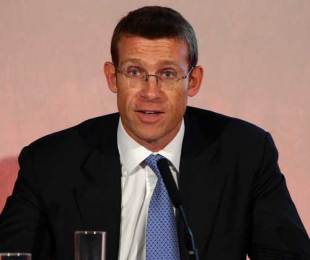|
English Rugby
Players' union raise their game
Scrum.com
October 12, 2009

RPA chief executive Damian Hopley talks to the media in London
© Getty Images
Enlarge
The re-branded Rugby Players' Association has launched a bid for greater funding from the Rugby Football Union and Premier Rugby. The RPA - previously the Professional Rugby Players' Association (PRA) - announced today that the organisation is refocusing and expanding to include players from the Championship and the elite women's game on top of more than 500 existing members from Guinness Premiership clubs. And to cater for this increased membership the RPA is looking for further support from their "industry partners" in the form of a share of the increasing commercial value of their sport. The players' union currently generate £900,000 of their own income every year but also rely heavily on annual hand-outs totalling £700,000 from the RFU and Premier Rugby. That deal is up for re-negotiation - and the RPA want to implement the funding model used in football, cricket and other sports to maximise their revenue stream. The Professional Footballers' Association are funded by a percentage of the television revenues generated by the Football Association, the Premier League and Football League. The figures would be different in rugby, but RPA chief executive Damian Hopley is anxious to implement a similar system. "We will be commencing funding negotiations with our industry partners Premier Rugby and the Rugby Football Union in the coming months, and our objective is to secure long-term unconditional funding linked to the commercial growth of our game," he said. "With our ambition to serve a broader membership, safeguard players' interests and extend the appeal of the game the RPA want to make sure their funding is maximised. "Our current funding is a one-year deal that expires at the end of July. With a broader church, we need more resources. We feel we have been a very mature and worthwhile stakeholder in the game and we just feel that, as the game grows commercially, our funding should be linked to that. There are models in the NFL and with the PFA, with a percentage of televisions revenues. We don't know what the right model is yet but we want to negotiate that." The RPA's work covers education programmes for players, the players' benevolent fund, injury research and access to legal advice should a player require it. Hopley spent the summer working with the players caught up in the Bath drugs saga and Tom Williams, who was at the centre of Harlequins' Bloodgate scandal. And it is thought the work the RPA did over the summer may actually have helped their case. "If ever an incident proved the worth of a players' union it was that," he said. "Clearly we have to present a justifiable case and we want to make it unconditional, so we are not coming back to the well all the time. I think they absolutely recognise the work we have done on behalf of the players and what we have achieved and I would like to think they would be open to a good discussion about it." The RPA's annual subscription for players is currently £135, which is more than both the PFA and the Professional Cricketers' Association charge. The RPA today presented Matt Hampson, the former England Under-21s prop who suffered a catastrophic injury in 2005, with a cheque for £20,000 to help with the cost of installing a hydrotherapy pool into his house. Chairman David Barnes said, "It is essential this body is properly funded. We need to keep being pro-active. We are investing in areas such as neck stability and neck issues, so we can understand all areas of the body and do everything we can to reduce injuries in the future. It is not just injuries but education programmes and the image of the game. A fully-funded RPA will help drive the game forward." © Scrum.com
|
Live Sports
Communication error please reload the page.
-
Football
-
Cricket
-
Rugby
-
- Days
- Hrs
- Mins
- Secs
F1 - Abu Dhabi GP
Abu Dhabi Grand Prix December 11-131. Max Verstappen ()
2. Valtteri Bottas (Mercedes)
3. Lewis Hamilton (Mercedes)
4. Alexander Albon ()
5. Lando Norris ()
6. Carlos Sainz Jr ()
-
ESPNOtherLive >>
Darts - Premier League
Golf - Houston Open
Snooker - China Open
Tennis - Miami Open

